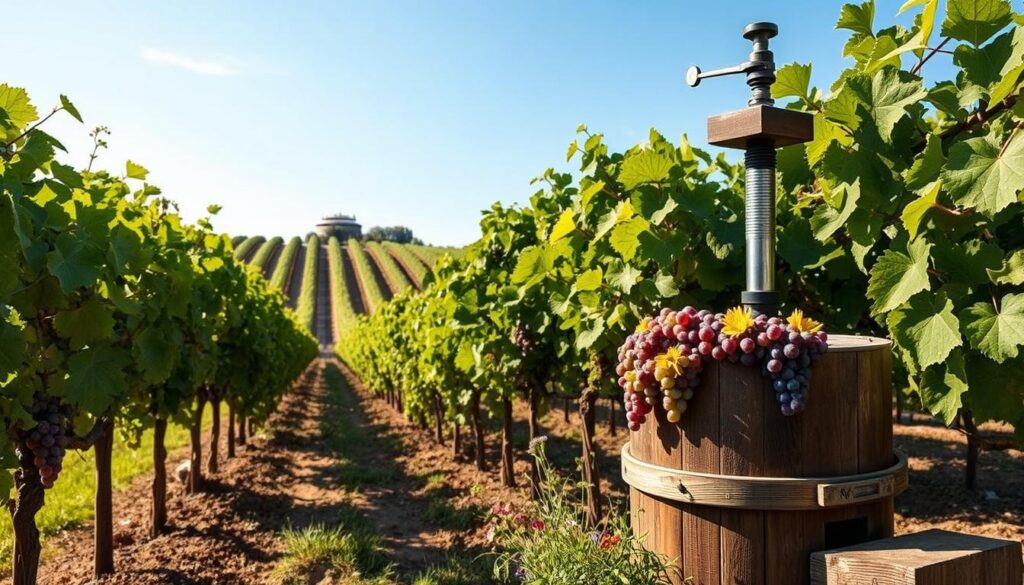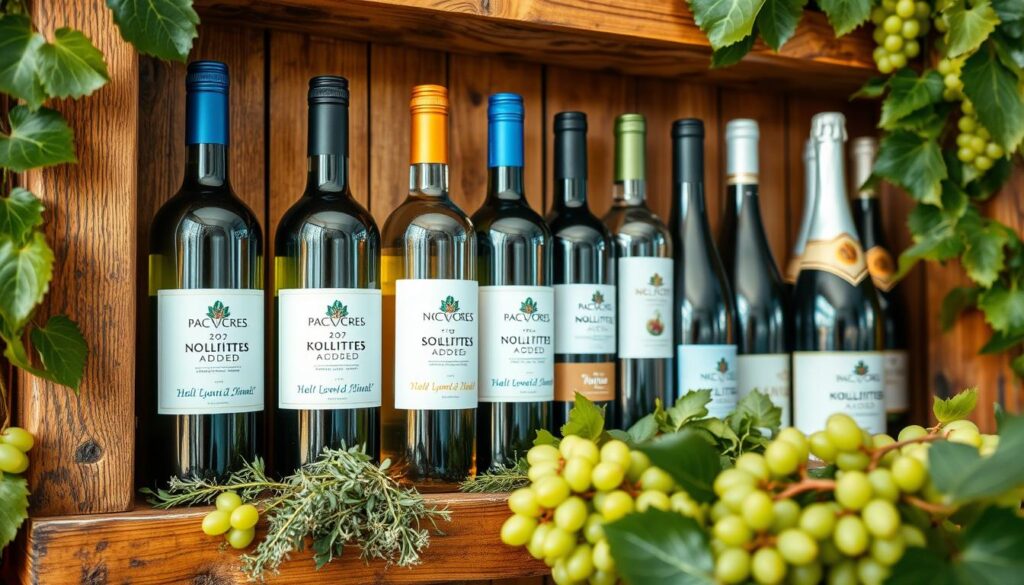We’re excited to share the world of natural wines with no added sulfites with you. These wines are pure and organic, perfect for health-conscious wine lovers. They let you enjoy your favorite drink without harmful additives. Let’s dive into the benefits and tastes of these special wines.
Key Takeaways
- Discover the world of natural wines with no added sulfites
- Learn about the benefits of choosing sulfite-free wines for your health
- Explore the different winemaking methods that produce these pure, organic wines
- Understand the rise of organic and biodynamic wine production
- Discover top regions and producers of natural, sulfite-free wines
Understanding Natural Wine: A Pure Approach to Winemaking
A new movement in winemaking focuses on natural and sustainable methods. Sulfite-free wines are made with little intervention and organic practices. They are winning over wine lovers. Let’s explore the traditional methods and the philosophy behind this approach.
Traditional vs. Modern Winemaking Methods
Modern winemaking often uses additives and technology. But natural winemakers stick to traditional techniques. They let grapes show their true flavors and terroir. This careful process includes:
- Organic and biodynamic farming to care for the vines
- Little or no sulfites, unlike many conventional wines
- Spontaneous fermentation with natural yeast
- Gentle pressing and aging in neutral oak
The Philosophy Behind Natural Wine Production
Natural wine production is more than just winemaking. It’s a sustainable lifestyle for these winemakers. They aim to make preservative-free wines that show the land’s unique character. They respect the grape’s authenticity and nature’s rhythms, while reducing environmental harm.
Natural winemakers want to share the true taste of the terroir. They avoid the heavy influence of modern winemaking. Their dedication to sulfite-free wines shows their love for winemaking and the environment.
“We’re not just making wine, we’re telling a story – the story of the land, the people, and the gentle touch that brings it all together.” – Jane Doe, Natural Winemaker
What Makes Wine Truly Sulfite-Free?
Finding no sulfites wines means knowing how they’re made. Natural wines use methods without additives. This makes them different from regular wines.
No sulfites wines don’t have added sulfites. Sulfites help keep wine fresh longer. But, no sulfites wines offer a natural choice for those who want it.
- Organic and biodynamic farming practices: Natural wine makers use sustainable farming. This means no synthetic additives like sulfites.
- Minimal intervention in the winemaking process: No sulfites wines are made with care. They avoid heavy processing to let the grape’s natural flavors show.
- Careful fermentation and aging: The making and aging of additive-free wines are done with great attention. This keeps the wine pure, without sulfites.
The beauty of no sulfites wines lies in their ability to let the true essence of the grape shine through, offering a pure and authentic drinking experience.”
Learning about the winemaking for sulfite-free wines opens up a new world. You can find natural, additive-free wines that are good for your health.
Health Benefits of Choosing No Sulfites Wines
Wine lovers looking for a healthier choice are finding it in organic wine and preservative-free options. These wines, without sulfites, bring many health benefits to the table.
Reduced Allergic Reactions and Sensitivities
Sulfites in regular wines can cause allergies and sensitivities. Choosing no-sulfites-added wines might help reduce these issues. Symptoms like headaches and breathing problems could lessen.
Better Digestibility and Fewer Headaches
Without added sulfites, natural wines are easier to digest and may cause fewer headaches. Sulfites can upset your stomach. Not using them makes wine more enjoyable and less likely to cause problems.
Natural Antioxidant Properties
Organic wine makers often stick to old-school methods. This keeps the grapes’ natural antioxidants. These antioxidants are good for your health and might help fight off age-related diseases.
By picking preservative-free wines, you start a new adventure. You’ll learn about the health benefits of these natural wines. The no-sulfites movement is changing how we see and enjoy wine.
The Rise of Organic and Biodynamic Wine Production
Winemaking is changing, moving towards more sustainable methods. Organic and biodynamic wine production are becoming more popular. People want wines that taste great and are good for the planet.
Organic and biodynamic winemaking focus on natural methods. They avoid synthetic fertilizers and pesticides. Instead, they use natural ways to grow grapes and make wine.
Organic wine growers use natural compost and cover crops. They manage the soil carefully. This makes grapes full of flavor and helps the environment.
Biodynamic winemaking sees the vineyard as a living thing. Growers use natural preparations and farming rhythms. This approach makes the soil and vines healthy, creating amazing organic wines without additives.
| Organic Wine | Biodynamic Wine |
|---|---|
| Grown without synthetic pesticides or fertilizers | Follows biodynamic principles, treating the vineyard as a self-sustaining ecosystem |
| Grapes are certified organic | Utilizes natural preparations and rhythmic farming techniques |
| May contain low levels of sulfites | Sulfite-free |
The demand for sustainable wines is rising. Organic and biodynamic wines offer a healthy choice. They are delicious and support the environment.

The future of winemaking lies in the hands of those who embrace the principles of organic and biodynamic farming. These sustainable practices not only produce exceptional wines but also contribute to the preservation of our planet.
Top Regions Producing Natural Sulfite-Free Wines
The natural wine movement is growing fast. We’re excited to look at the top places known for making great sulfite-free, organic wines. From Europe’s old vineyards to the new producers in the New World, and the new markets starting to make natural wines, let’s explore the wide world of natural wine.
European Natural Wine Regions
Europe is at the heart of traditional winemaking. Places like France’s Loire Valley, Italy’s Piedmont, and Spain’s Catalonia are full of winemakers who love to make natural wine without sulfites. They work hard in their vineyards, using methods like biodynamic and organic farming. This way, they make sulfite-free wines that really show off the land’s flavor.
New World Natural Wine Destinations
The New World is also making a big impact in natural wine. Places like California’s Sonoma County, Chile’s Casablanca Valley, and New Zealand’s Marlborough are leading the way. These producers are trying new things and making sulfite-free wines that are unique and show off their local terroirs.
Emerging Natural Wine Markets
New markets are also joining the natural wine scene. Countries like South Africa, Greece, and Austria are making a splash. They’re using their own special winemaking traditions to create sulfite-free wines that are exciting and new for wine lovers.
The world of natural, sulfite-free wines is full of history, new ideas, and creativity. Whether you’re looking at Europe’s classic wines, the bold flavors of the New World, or the new wines from emerging markets, now is a great time to try the pure and real taste of organic, natural wine.
How to Identify Genuine No Sulfites Added Wines
Exploring the world of wine can be a fun journey, especially when you’re looking for no sulfites and sulfite-free wines. As someone who cares about what’s in their wine, it’s key to know what’s in your favorite bottles. Here are some tips to find real no sulfites added and organic wine options.
Read the Label Closely
To find no sulfites added wines, start by reading the labels carefully. Look for phrases like “no sulfites added,” “sulfite-free,” or “made with organic grapes.” These phrases mean the wine was made without added sulfites, a common preservative in regular wines.
Understand Wine Certifications
Also, watch for trusted certifications on the labels. Look for USDA Organic, Demeter Biodynamic, and Ecocert. These labels show the wine meets strict standards for being organic and sulfite-free.
Identify Reputable Producers
- Research the winery’s reputation and commitment to natural, low-intervention winemaking practices.
- Look for producers who are transparent about their farming and production methods.
- Seek out small, family-owned wineries that prioritize quality and authenticity over mass production.
By reading labels well, knowing about certifications, and researching wineries, you can find no sulfites added and organic wines with confidence. Happy wine tasting!

| Certification | What it Means |
|---|---|
| USDA Organic | Wines made from organically grown grapes, with no added sulfites. |
| Demeter Biodynamic | Wines produced using biodynamic farming methods, with no added sulfites. |
| Ecocert | Wines certified as organic, with no added sulfites. |
Storage and Aging Considerations for Natural Wines
Enjoying natural wines means we need to pay attention to how we store and age them. These wines, made without preservatives, need special care. Let’s look at the best ways to keep these bottles in top shape.
Optimal Storage Conditions
Natural wines need a cool, consistent place to be stored. The ideal temperature is between 55-65°F (13-18°C). Avoiding extreme heat or temperature changes is key to keeping the wine fresh.
It’s also important to store them in a dark, humid place. Direct sunlight can make the wine age faster. This helps keep the wine’s flavors intact.
Shelf Life Expectations
Natural wines don’t last as long as others. They usually stay fresh for 1-3 years. This depends on the type of wine and how it was made.
Some natural wines can age well for longer. But, it’s important to watch how they change. Enjoying them at the right time lets you fully experience their unique taste.
Learning about storing and aging natural wines helps us enjoy every sip. These organic and natural wine options are truly special.
The true essence of natural wine lies not only in its production method but also in the care we take to preserve its integrity.” – Sommelier, Jane Doe
Food Pairing Guide for Natural Wines
Pairing natural wines with food is a fun adventure! These wines, with their special flavors and no added sulfites, offer endless possibilities. Whether you’re into organic, vegan, or classic natural wines, we’ve got great pairing ideas for you.
Crisp and Refreshing Natural Whites
Match your favorite natural white wines with light, fresh dishes. This way, the wine’s delicate flavors shine. Try them with:
- Grilled or sautéed seafood
- Salads with citrusy vinaigrettes
- Herb-infused vegetable dishes
- Creamy risottos or pasta primavera
Bold and Fruity Natural Reds
For natural red wine pairings, choose dishes that match the wine’s bold flavors and tannins. Consider pairing them with:
- Hearty stews or braised meats
- Grilled or roasted vegetables
- Mushroom-based dishes
- Savory cheese platters
Unique Natural Orange Wines
The world of natural orange wines is full of pairing possibilities. These complex wines go well with:
- Roasted root vegetables
- Earthy mushroom dishes
- Boldly flavored cheeses
- Grilled or roasted poultry
Remember, the best way to pair natural wines with food is to experiment and enjoy it. Let each wine’s unique qualities guide your taste. Bon appétit!
Popular Natural Wine Varieties and Producers
Start an exciting journey into the world of natural wines! We’ll show you top red, white, and orange wines from around the world. These are from top organic and biodynamic producers. Get ready to taste the unique flavors and quality of these sulfite-free, organic, and biodynamic wines.
Red Natural Wine Selections
Red wine lovers should try the Pinot Noir from Domaine Rollin in Burgundy, France. This organic winery makes a Pinot Noir that’s elegant and complex. Another great choice is the Cabernet Franc from Domaine Zind-Humbrecht in Alsace, France. It’s known for its depth, structure, and vibrant fruit flavors.
White and Orange Wine Options
White wine fans will love the Riesling from Weingut Clemens Busch in Germany’s Mosel region. This biodynamic winery creates a Riesling that’s aromatic and textured. It perfectly balances acidity and minerality.
For a unique taste, try the orange wine from Radikon in Friuli, Italy. This family-owned biodynamic estate makes a stunning orange wine. It’s a blend of structure, tannins, and citrus notes.
“These natural wines are true expressions of the land, crafted with respect for the environment and a commitment to showcasing the inherent character of the grapes.”
Environmental Impact of Natural Wine Production
Natural winemaking is becoming more popular. It focuses on making wine in a way that’s good for the planet. Organic and biodynamic farming are key to this approach. They help keep the environment healthy and reduce chemical use.
Organic wine doesn’t use harmful chemicals. Instead, it uses natural stuff to keep the soil and vines healthy. Biodynamic farming goes even further. It sees the vineyard as a whole, where everything works together for a balanced ecosystem.
This approach helps the environment and makes better-tasting wines. Natural wine makers are showing the way to a greener future. They use clean energy, save water, and manage waste well. As more people want organic and biodynamic wines, the industry will keep getting greener.
FAQ
What is natural wine?
Natural wine is made with little help from humans. It uses organic or biodynamic farming and no additives like sulfites. This wine aims to show the true taste of the grapes and where they grow.
What are the benefits of choosing natural, sulfite-free wines?
Natural, sulfite-free wines might be better for you. They could cause fewer allergies, be easier to digest, and have natural antioxidants. They might also help with wine-related headaches.
How can I identify genuine no-sulfites-added wines?
To find real no-sulfites-added wines, look for clear labels and certifications like organic or biodynamic. Choose wines from trusted makers known for natural winemaking. Learn about common signs and certifications of sulfite-free wines.
What are the best storage and aging conditions for natural wines?
Natural wines need special care because they lack sulfites. Store them in a cool, dark, and humid place. They won’t last as long as wines with added sulfites.
What are some popular natural wine varieties and producers to try?
Try wines like Cabernet Franc, Pinot Noir, Chardonnay, and “orange” wines. Look for wines from France, Italy, Spain, and the U.S. from makers like Domaine Zind-Humbrecht, Weingut Bründlmayer, and Denavolo.
How does natural wine production impact the environment?
Natural winemaking is good for the planet. It uses organic and biodynamic farming. This helps biodiversity, cuts down on chemicals, and makes ecosystems healthier. So, choosing natural wine is a green choice.





